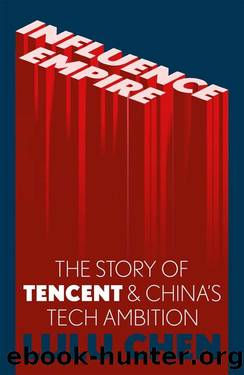Influence Empire: The Story of Tencent and Chinaâs Tech Ambition by Lulu Chen

Author:Lulu Chen [Chen, Lulu]
Language: eng
Format: epub
ISBN: 9781529346855
Publisher: Hodder & Stoughton
Published: 2022-07-13T16:00:00+00:00
REVENUE PRESSURE
Internally, though, Allen faces mounting pressure. For all of WeChatâs influence, the app itself isnât a revenue driver, and for many years it had to be heavily subsidised. Tencentâs social media ads only accounted for 10 per cent of revenue as of 2014, when WeChat hit 400 million users. More than half of the companyâs money came from games, mostly from desktop then.
Staff at Tencent told me that senior executives have pushed WeChat to generate more revenue through ads. But WeChat product managers, proud and almost idealistic, remained resistant to the idea. The staff from the gaming division often felt they were carrying all the weight, while the WeChat unit basked in glory despite bringing in little money.
Allen has consistently pushed back against introducing ads at all, even though he eventually relented in 2015, starting with one ad per day for users. Today I still only see two ads a day, tops.
At perhaps WeChatâs most critical juncture, Pony stuck with his instincts, siding with Allenâs argument that online ads were not the only solution. They envisioned that WeChat could become so much more than just an ad dispenser; instead it could be the ultimate connector â food delivery, taxi hailing, on-demand goods like over-the-counter meds and groceries â connecting individuals with people and services.
That concept â bridging the online and offline worlds â has also been Tencentâs strategy for the past decade, and conceivably for the future.
Despite Tencent generating most of its revenue from games in the past, the company has been shifting and expanding its sources of income, including cloud and enterprise services like providing membership and HR management tools for businesses on WeChat.
The app itself has become so much more than a WhatsApp-a-like, steadily morphing into an immense online bazaar that, by the end of 2020, was funnelling $240-billion-worth of business in goods, games and services like ride-hailing and food delivery. It would become Tencentâs impossibly large window to Chinaâs consumers, a giant platform through which it can sell, market, draw and connect users and ignite online interactions. In short, itâs become synonymous with Tencentâs steady ascent into the upper echelons of the global internet industry.
In the process of building WeChat into a connector, Pony had to also ensure that there were enough reasons people would open the app in the first place. Ordering food on Meituan was one of them. But the other function that both Pony and Jack Ma foresaw as essential for their companiesâ success was ride-hailing. Calling for taxis, high-end cars and pooling with other commuters is deemed as a high-frequency business â on average a person needs to use the service at least two times a day â a perfect way to keep users engaged.
Both Alibaba and Tencent saw the potential in ride-hailing and how it could benefit their mobile payment services. And both billionaires went after the same strategy, again backing a third-party champion they thought could promote their digital wallet ecosystems.
The subsequent war would end up with billions burnt, Chinaâs
Download
This site does not store any files on its server. We only index and link to content provided by other sites. Please contact the content providers to delete copyright contents if any and email us, we'll remove relevant links or contents immediately.
Exploring Deepfakes by Bryan Lyon and Matt Tora(8367)
Robo-Advisor with Python by Aki Ranin(8311)
Offensive Shellcode from Scratch by Rishalin Pillay(6429)
Microsoft 365 and SharePoint Online Cookbook by Gaurav Mahajan Sudeep Ghatak Nate Chamberlain Scott Brewster(5678)
Ego Is the Enemy by Ryan Holiday(5413)
Management Strategies for the Cloud Revolution: How Cloud Computing Is Transforming Business and Why You Can't Afford to Be Left Behind by Charles Babcock(4563)
Python for ArcGIS Pro by Silas Toms Bill Parker(4503)
Machine Learning at Scale with H2O by Gregory Keys | David Whiting(4292)
Elevating React Web Development with Gatsby by Samuel Larsen-Disney(4226)
Liar's Poker by Michael Lewis(3441)
Learning C# by Developing Games with Unity 2021 by Harrison Ferrone(3350)
Speed Up Your Python with Rust by Maxwell Flitton(3312)
OPNsense Beginner to Professional by Julio Cesar Bueno de Camargo(3283)
Extreme DAX by Michiel Rozema & Henk Vlootman(3263)
Agile Security Operations by Hinne Hettema(3190)
Linux Command Line and Shell Scripting Techniques by Vedran Dakic and Jasmin Redzepagic(3174)
Essential Cryptography for JavaScript Developers by Alessandro Segala(3144)
Cryptography Algorithms by Massimo Bertaccini(3086)
AI-Powered Commerce by Andy Pandharikar & Frederik Bussler(3052)
